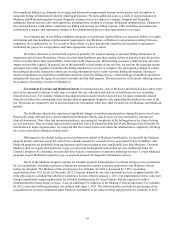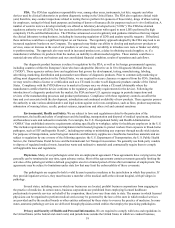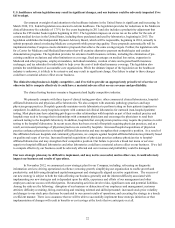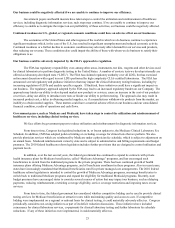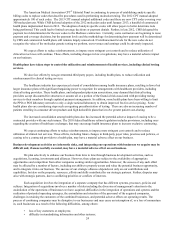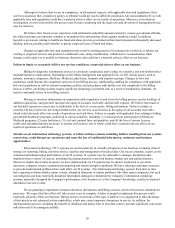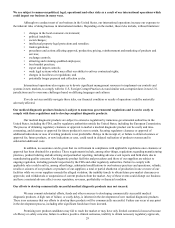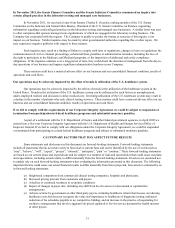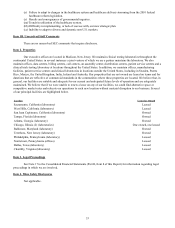Quest Diagnostics 2012 Annual Report Download - page 29
Download and view the complete annual report
Please find page 29 of the 2012 Quest Diagnostics annual report below. You can navigate through the pages in the report by either clicking on the pages listed below, or by using the keyword search tool below to find specific information within the annual report.26
Although we believe that we are in compliance, in all material respects, with applicable laws and regulations, there
can be no assurance that a regulatory agency or tribunal would not reach a different conclusion. Any noncompliance by us with
applicable laws and regulations could have a material adverse effect on our results of operations. Moreover, even when an
investigation is resolved favorably, the process may be time-consuming and the legal costs and diversion of management focus
may be extensive.
We believe that, based on our experience with settlements and public announcements by various government officials,
the federal and state governments continue to strengthen their enforcement efforts against healthcare fraud. In addition,
legislative provisions relating to healthcare fraud and abuse provide government enforcement personnel substantially increased
funding, powers, penalties and remedies to pursue suspected cases of fraud and abuse.
Changes in applicable laws and regulations may result in existing practices becoming more restricted, or subject our
existing or proposed services and products to additional costs, delay, modification, withdrawal or reconsideration. Such
changes could require us to modify our business objectives and could have a material adverse effect on our business.
Failure to timely or accurately bill for our services could have a material adverse effect on our business.
Billing for diagnostic information services is extremely complicated and is subject to extensive and non-uniform rules
and administrative requirements. Depending on the billing arrangement and applicable law, we bill various payers, such as
patients, insurance companies, Medicare, Medicaid, physicians, hospitals and employer groups. Changes in laws and
regulations could increase the complexity and cost of our billing process. Additionally, auditing for compliance with applicable
laws and regulations as well as internal compliance policies and procedures adds further cost and complexity to the billing
process. Further, our billing systems require significant technology investment and, as a result of marketplace demands, we
need to continually invest in our billing systems.
Missing or incorrect information on requisitions adds complexity to and slows the billing process, creates backlogs of
unbilled requisitions, and generally increases the aging of accounts receivable and bad debt expense. We believe that much of
our bad debt expense in recent years is attributable to the lack of, or inaccurate, billing information. Failure to timely or
correctly bill may lead to our not being reimbursed for our services or an increase in the aging of our accounts receivable,
which could adversely affect our results of operations and cash flows. Failure to comply with applicable laws relating to billing
government healthcare programs could lead to various penalties, including: (1) exclusion from participation in Medicare/
Medicaid programs; (2) asset forfeitures; (3) civil and criminal fines and penalties; and (4) the loss of various licenses,
certificates and authorizations necessary to operate our business, any of which could have a material adverse effect on our
results of operations or cash flows.
Attacks on our information technology systems, or failure in these systems, including failures resulting from our systems
conversions, could disrupt our operations and cause the loss of confidential information, customers and business
opportunities.
Information technology (“IT”) systems are used extensively in virtually all aspects of our business, including clinical
testing, test reporting, billing, customer service, logistics and management of medical data. Our success depends, in part, on the
continued and uninterrupted performance of our IT systems. IT systems may be vulnerable to damage, disruptions and
shutdown from a variety of sources, including telecommunications or network failures, human acts and natural disasters.
Moreover, despite the security measures we have implemented, our IT systems may be subject to physical or electronic
intrusions, computer viruses, unauthorized tampering and similar disruptive problems. We have taken precautionary measures
to prevent unanticipated problems that could affect our IT systems. Our information technology systems from time to time
have experienced minor attacks, minor viruses, attempted intrusions or similar problems, like other major companies, but each
was mitigated, and none materially disrupted, interrupted, damaged or shutdown the Company's information technology
systems, materially disrupted the Company's performance of its business or, to the Company's knowledge, resulted in material
unauthorized access to data.
We are planning to implement common laboratory information and billing systems, which will promote standardized
processes. We expect that this effort will take several years to complete. Failure to properly implement this process could
materially adversely affect our business. During system conversions of this type, workflow is re-engineered to take advantage
of best practices and enhanced system capabilities, which may cause temporary disruptions in service. In addition, the
implementation process, including the transfer of databases and master files to new data centers, presents significant conversion
risks that need to be managed carefully.


